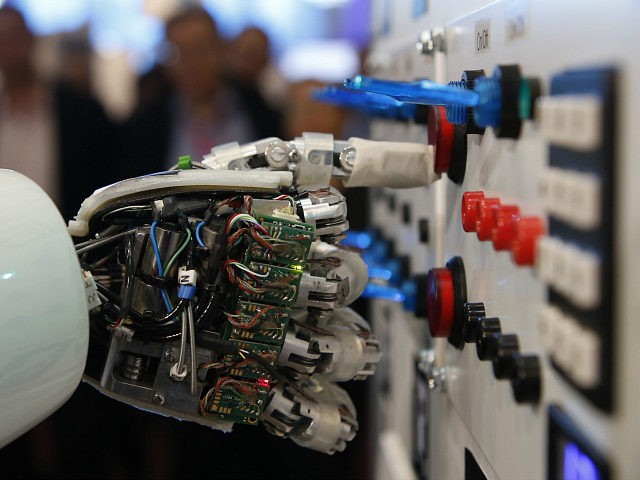Advances in robotics have led to the production of cheaper industrial robots, providing easier access to production line quality machinery for smaller businesses, potentially resulting in fewer jobs for human workers.
Bloomberg reports that robots have become more compact and user-friendly as technological advances are made across the world. For example, collaborative models called Cobots have built-in sensors to prevent them from harming human workers and can perform a multitude of menial tasks from stocking shelves to delivering room service. As these robots come down in price — with some costing as little as $25,000 — small businesses across the country are finding more uses for these robotic workers every day.
Stewart McMillan, chief executive officer of Task Force Tips Inc., spoke to Bloomberg, saying, “It’s just being brought down to an affordability level that gets to the smaller manufacturer, you can sit down with these things and, in a matter of minutes, watch a couple of YouTube videos and know how to do basic programming.” Task Force Tips manufactures fire hose nozzles and actually utilizes a production line robot to perform repetitive tasks previously performed by a human worker. Now a robot grabs a half-finished valve from a miller and hands it to a mechanized machine which feeds the part into the final processor.
McMillan has added as many as a dozen robots to his workforce over the past four years, allowing him to compete with firms in countries such as China which produce similar parts for cheaper by employing lower-paid workers. McMillan did, however, state that robots are not hired at the expense of human workers and a human worker is not fired when a new robot is brought in. McMillan said that the workers are usually re-trained as a technician or machine operator.
This is not the case in many businesses, however, which regularly use robots as a replacement for human workers. Economists from the Massachusetts Institute of Technology and Boston University recently concluded that both jobs and wages decline in areas of the U.S. where more robots are used in production. Automation is affecting jobs for low-skilled workers significantly, with many predicting that half of the jobs that exist today may soon be occupied by robotic workers.
Some industrial automation creates now jobs — a Boston Consulting Group study that focused on Germany stated that intelligent automation will result in the loss of approximately 610,000 factory jobs, but overall will create 960,000 new positions. Brian Carlisle, co-founder of Precise Automation in Freemont, California, said, “Everyone is bemoaning the stagnation of productivity improvement in the U.S. and we aren’t seeing other things that are improving that output per worker. Robotics has the potential to do that over the next few years.”
Lucas Nolan is a reporter for Breitbart News covering issues of free speech and online censorship. Follow him on Twitter @LucasNolan_ or email him at lnolan@breitbart.com

COMMENTS
Please let us know if you're having issues with commenting.